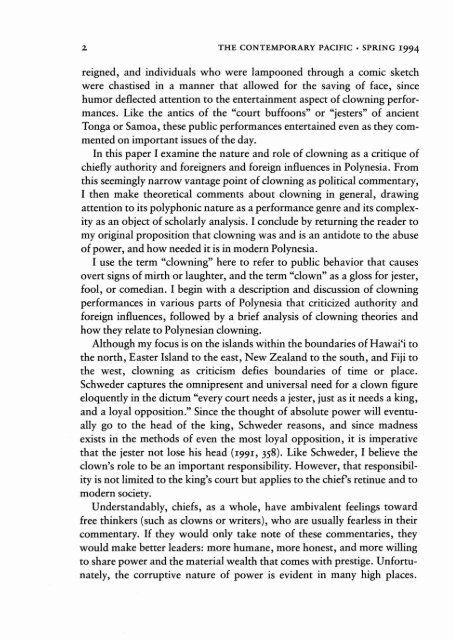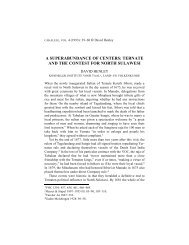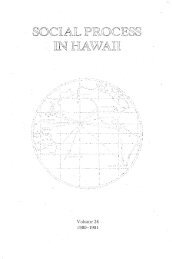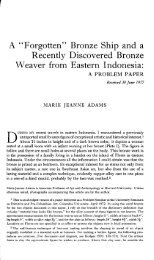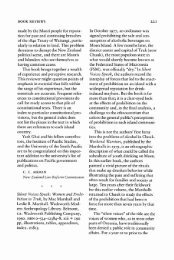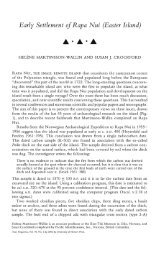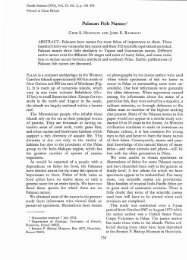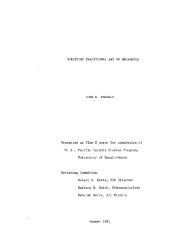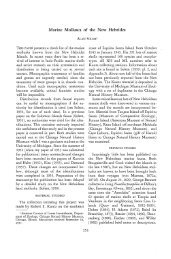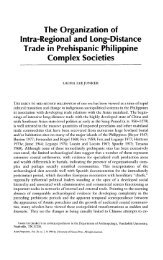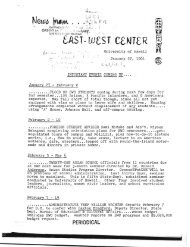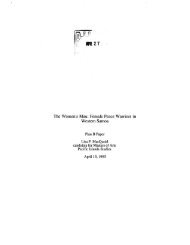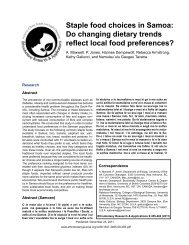Clowning as Political Commentary: Polynesia, Then ... - ScholarSpace
Clowning as Political Commentary: Polynesia, Then ... - ScholarSpace
Clowning as Political Commentary: Polynesia, Then ... - ScholarSpace
Create successful ePaper yourself
Turn your PDF publications into a flip-book with our unique Google optimized e-Paper software.
2 THE CONTEMPORARY PACIFIC· SPRING 1994<br />
reigned, and individuals who were lampooned through a comic sketch<br />
were ch<strong>as</strong>tised in a manner that allowed for the saving of face, since<br />
humor deflected attention to the entertainment <strong>as</strong>pect of clowning performances.<br />
Like the antics of the "court buffoons" or "jesters" of ancient<br />
Tonga or Samoa, these public performances entertained even <strong>as</strong> they commented<br />
on important issues of the day.<br />
In this paper I examine the nature and role of clowning <strong>as</strong> a critique of<br />
chiefly authority and foreigners and foreign influences in <strong>Polynesia</strong>. From<br />
this seemingly narrow vantage point of clowning <strong>as</strong> political commentary,<br />
I then make theoretical comments about clowning in general, drawing<br />
attention to its polyphonic nature <strong>as</strong> a performance genre and its complexity<br />
<strong>as</strong> an object of scholarly analysis. I conclude by returning the reader to<br />
my original proposition that clowning w<strong>as</strong> and is an antidote to the abuse<br />
ofpower, and how needed it is in modern <strong>Polynesia</strong>.<br />
I use the term "clowning" here to refer to public behavior that causes<br />
overt signs of mirth or laughter, and the term "clown" <strong>as</strong> a gloss for jester,<br />
fool, or comedian. I begin with a description and discussion of clowning<br />
performances in various parts of <strong>Polynesia</strong> that criticized authority and<br />
foreign influences, followeq by a brief analysis of clowning theories and<br />
how they relate to <strong>Polynesia</strong>n clowning.<br />
Although my focus is on the islands within the boundaries of Hawai'i to<br />
the north, E<strong>as</strong>ter Island to the e<strong>as</strong>t, New Zealand to the south, and Fiji to<br />
the west, clowning <strong>as</strong> criticism defies boundaries of time or place.<br />
Schweder captures the omnipresent and universal need for a clown figure<br />
eloquently in the dictum "every court needs a jester, just <strong>as</strong> it needs a king,<br />
and a loyal opposition." Since the thought of absolute power will eventually<br />
go to the head of the king, Schweder re<strong>as</strong>ons, and since madness<br />
exists in the methods of even the most loyal opposition, it is imperative<br />
that the jester not lose his head (1991, 358). Like Schweder, I believe the<br />
clown's role to be an important responsibility. However, that responsibility<br />
is not limited to the king's court but applies to the chief's retinue and to<br />
modern society.<br />
Understandably, chiefs, <strong>as</strong> a whole, have ambivalent feelings toward<br />
free thinkers (such <strong>as</strong> clowns or writers), who are usually fearless in their<br />
commentary. If they would only take note of these commentaries, they<br />
would make better leaders: more humane, more honest, and more willing<br />
to share power and the material wealth that comes with prestige. Unfortunately,<br />
the corruptive nature of power is evident in many high places.


